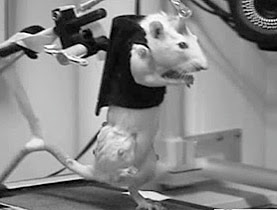Does Loneliness Reduce the Benefits of Exercise?
With Valentine’s Day around the corner, this seems the proper moment to ask whether being in a relationship changes how you exercise and, perhaps even more intriguing, whether relationships affect how exercise changes you.
That latter possibility was memorably raised in an elegant series of experiments conducted not long ago at Princeton University. The researchers were trying to replicate earlier work in which the brains of mice given free access to running wheels subsequently fizzed with new brain cells, a process known as neurogenesis, and the mice performed better on rodent intelligence tests than those without access to wheels. To the Princeton researchers’ surprise, when they performed the same study with rats, “which are a little closer, physiologically, to humans,” said Alexis Stranahan, the lead author of the Princeton study, running did not lead to neurogenesis. The rats’ brains remained resolutely unaffected by exercise.
Hoping to discover why, the researchers examined how the rats and mice had been housed and learned that while the mice in the earlier experiments had lived in groups, the rats were kept in single-occupancy cages. Rats, in the wild, are gregarious. They like to be together. The researchers wondered whether isolation could somehow be undermining the cerebral benefits of exercise at a cellular level.
Putting this idea to the test, they divided young male rats into groups housed either in threes or singly and, after a week, gave half of them access to running wheels. All of these rats ran, but only the rats with cage mates experienced rapid and robust neurogenesis. Not until after weeks of running, long after the other socially engaged rats’ brains had sprouted plentiful new neurons and neural connections, did the lone rats start to produce brain cells. Social isolation had dramatically suppressed and slowed the process.
Why and how isolation affects exercise and neurogenesis remain somewhat mysterious, said Dr. Stranahan, now an assistant professor at Georgia Health Sciences University. But part of the cause almost certainly involves an excess of tension. “Exercise is a form of stress,” she pointed out. So is social isolation. Each, independently, induces the release of stress hormones (primarily corticosterone in rodents and cortisol in people). These hormones have been found, in multiple studies, to reduce neurogenesis. Except after exercise; then, despite increased levels of the hormones, neurogenesis booms. It’s possible, Dr. Stranahan said, that social connections provide a physiological buffer, a calming, that helps neurogenesis to proceed despite the stressful nature of exercise. Social isolation removes that protection and simultaneously pumps more stress hormones into the system, blunting exercise’s positive effects on brainpower.A recent follow-up experiment by scientists at the University of Houston produced similar results in female rats, which are even more sociable than males. Housed alone, the distaff rats experienced significantly less neurogenesis than female rodents with roommates, even though both groups ran similar distances on their wheels.
Does this happen in lonely human exercisers? No one knows, Dr. Stranahan said, since comparable experiments on people are impossible. (The animals were sacrificed.) But she added, “There is abundant epidemiological literature in people that loneliness has cognitive consequences, contributing to depression, strokes, Alzheimer’s and so on.”
On the other hand, new science suggests that at least in people, close relationships may reduce how fit someone is. For a study published online in December, researchers cross-correlated data about the cardiovascular fitness and relationship status of 8,871 adults who had been tested several times over the years at the Cooper Clinic in Dallas. They found that single women who remained single also retained most of their fitness, while those who married tended to become less fit. Meanwhile, men who divorced became fitter; men who remarried often let themselves go. The authors speculated that divergent worries about appearance and desirability could have been motivating single people to work out and married couples to slack off. (No data was included about those insidious destroyers of workouts, children.)
Taken together, these otherwise varying studies of rodents and humans suggest that while exercise may seem a simple physical activity engaged in by individuals, it is not. It is in fact a behavior plaited with social and emotional concerns that can influence how often you work out and with what physiological consequences. It may take longer for lonely people to improve the state of their brains with exercise, Dr. Stranahan said, just as it may take a divorce to get some men in shape. But thankfully, there are some aspects of exercise and interpersonal relationships that remain stubbornly unambiguous. In a 2010 study from the Neuroscience Institute at Princeton, male rats given access to “sexually receptive” females enthusiastically engaged in procreative activity, a moderate workout in its own right and, despite raising their stress hormones, vigorously pumped up the amount of neurogenesis in their brains. Sex improved their ability to think, obvious jokes notwithstanding.


No comments:
Post a Comment